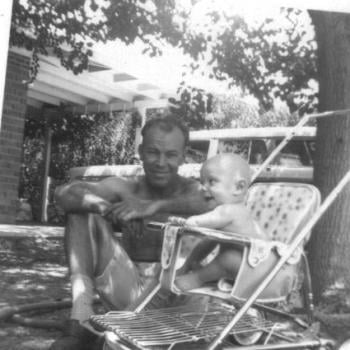Lectionary Reflections
1 Samuel 2:18-20, 26
December 30, 2012
Now that we have once again celebrated the birth of Jesus with candles and bells and choirs and food and presents and trumpets and egg nog—and the myriad other ways that you saw in the holy birth—it is time once again for the church to get back to the business of reflecting on why the day exists at all. After all, we cannot have this much hoopla every Sunday; we would all grow very exhausted. And too much pumpkin pie and ice cream makes John and Sue both dull and fat. So, now that we have this baby, what are we to do with him, or for him, or to him, or ...?
Maybe some sacred history could help, and so our gaze falls again on the stories that precede the Bethlehem boy by over a thousand years. The near-miraculous birth of the prophet Samuel to the barren Hannah and her snooty husband, Elkanah, appear to prefigure in interesting ways the birth and hopes for the one we call Christ. The story is found in I Sam 2. In chapter 1 of the story, Hannah is only one of the wives of Elkanah, and while her co-wife, Penninah, seems to drop a baby on the family every year, Hannah can have no child. Here is one biblical example where the problem is plainly not with the male! Hannah goes each year to sacrifice with her family in Shiloh, but each year she goes without her own child. Fed up with her obnoxious companion wife, who takes every opportunity to lord it over Hannah concerning her astonishing fertility and Hannah's obvious infertility, Hannah prays mightily in the temple at Shiloh for a child of her own.
The foolish priest of the temple, Eli, witnesses her desperate and silent entreaties to YHWH and assumes that she is drunk (1:14). This seems a quite ridiculous conclusion to draw under the circumstances; has the old priest never witnessed a serious supplicant in his temple before? Despite the priest's obtuseness and rude behavior, YHWH answers her prayer, she becomes pregnant and gives birth to the boy, Samuel. And because she honors her vow to YHWH, she gives him as a nazirite (a "dedicated one") to the temple. According to the nazirite vow, the boy is never to drink wine, nor be close to dead bodies. Nor is he ever to get a haircut. About the wine and hair, we learn nothing, but Samuel in his long life will have more than a little to do with dead bodies. In at least one instance in I Sam 15, he himself will murder a king with his own hands.
So Samuel is handed over to the temple of Shiloh and to the aging and less-than-competent hands of the priest Eli. One can only imagine what Hannah thought as she gave her son to Eli, a priest who could not distinguish between a genuine worshipper and a drunk! Still, she leaves him there and returns home. I Sam 2:11 tells us "the boy was serving YHWH in the presence of the priest Eli." Note that it does not say that Eli was serving YHWH; it only says that Samuel was serving YHWH. And this phrase is repeated in I Sam 2:18; "Now Samuel was serving in the presence of YHWH, being a boy wearing a linen ephod."
We can never be certain exactly what a "linen ephod" looks like, but II Sam 6 gives us some indication that it was a rather scanty garment, even though it is apparently the garment worn by some Israelite priests. In that later and quite famous story, David slips on a "linen ephod" before he leads the huge procession of the Ark of the Covenant up to the newly captured Jerusalem, "dancing with all his might." His furious wife, Michal, one of the dead Saul's daughters, upbraids her husband, shouting that he has "uncovered himself before the eyes of his servant's servants, just like any vulgar fellow would uncover himself" (II Sam 6:20)! This suggests that a linen ephod leaves little to the observer's imagination.
If all that is so, then we can easily understand why the loving Hannah makes for her son "a little robe" and takes it to him "each year" when she and Elkanah returned for the sacrifice (I Sam 2:19). I love this tiny feature of the story. Hannah, who has fulfilled her vow by offering her son to service of YHWH in the temple, hardly forgets him. Each year, before the yearly trip to the shrine, she weaves a robe, in increasing sizes following her son's growth, in order to cover him against the winter's cold, supplementing the skimpy ephod, which he is perhaps duty-bound to wear. This obvious love of a mother for her child, even though that child has a future of dangerous service to God, is fully reminiscent of Mary's love for her child, Jesus, though his and her destiny will be a most painful one.
After each visit for sacrifice in Shiloh, Eli, we are told, "blesses Elkanah and his wife (does the old priest still not know the woman's name?), and says, 'May YHWH give to you descendants from this woman (her name, please!) for the request that she requested of YHWH.' Then they went home" (I Sam 2:20). The same peculiar pun is contained here that was seen in I Sam 1:20. Hannah there says that she named her son Samuel, because she had "requested" him from YHWH. But the Hebrew word "request" is sha'al, a word suggesting the name "Saul," not Samuel, which means "God has heard." Of course, Saul and Samuel will finally have much to do with one another in this long story, but this double use of this verb is unusual.





